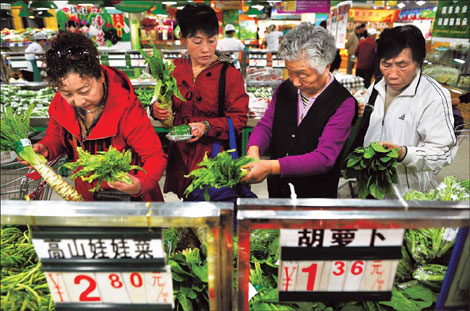New tracking system to boost food safety
|
Shoppers look at vegetables at a supermarket in Yinchuan, Ningxia Hui autonomous region on Thursday. The Ministry of Commerce signed agreements on Thursday with mayors from 10 cities to push forward a meat and vegetable traceability system in supermarkets and markets. Wang Peng / Xinhua |
SHANGHAI - Customers in 10 Chinese cities can now get a clear idea about how their meat and vegetable products arrive at their table, as part of the latest effort by the authorities to improve the country's food safety.
The Ministry of Commerce signed agreements on Thursday with mayors from 10 pilot cities to push forward a meat and vegetable traceability system in supermarkets and markets
Through a tracking code on the receipt of their vegetable and meat purchases, customers can track all stages of the food ranging from production to distribution, through the Internet or other terminals in stores.
The 10 first-phase pilot cities involved are Shanghai, Dalian, Nanjing, Wuxi, Hangzhou, Ningbo, Qingdao, Chongqing, Kunming and Chengdu.
Minister of Commerce Chen Deming said the safety assurance system, which is key to people's livelihood, will be gradually expanded nationwide.
The government will work toward building uniform standards across the country to implement the traceability system, Chen said.
Similar risk-management systems will also be expanded to sectors such as healthcare, he said.
The latest "traceable, verifiable and responsible" system will allow the government to identify food sources when unsafe products are found. This will help avoid unsafe food reaching more customers.
"The market can strengthen risk-management itself, while the public can get transparent information and supervise food safety," Chen said.
Food safety has become a major concern among Chinese customers following several scandals in the industry, including melamine-tainted milk and contaminated cowpeas.
RSA Group, a British insurance company, released a global risk survey earlier this week that showed unsafe food being a leading risk for Chinese people, second only to earthquakes.
Liu Feng, a housewife in Beijing, has been feeding her 3-year-old son only imported milk since the melamine scandal broke out.
"It's really takes time to rebuild trust. I hope such a new system can be adopted in Beijing as early as possible and cover more kinds of food," she said.
China Daily
(China Daily 10/22/2010 page15)















